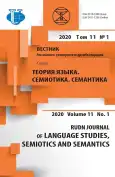A Linguistic Analysis of Petroleum-Related English Research Article Titles
- Authors: Filyasova Y.A.1
-
Affiliations:
- Saint-Petersburg University of Management Technologies and Economics
- Issue: Vol 11, No 1 (2020)
- Pages: 120-134
- Section: FUNCTIONAL GRAMMAR AND SEMANTICS
- URL: https://journal-vniispk.ru/2313-2299/article/view/323271
- DOI: https://doi.org/10.22363/2313-2299-2020-11-1-120-134
- ID: 323271
Cite item
Full Text
Abstract
Research article titles constitute a special type of text - concise, clear, and informative. The specificity of article titles is determined by a number of factors such as the object of research, the author’s personal style, academic tradition, the field of study among them. Today, article titles from different scientific areas are in the focus of scientific attention. This article presents the results of a linguistic analysis aimed at determining similarities and differences of research article titles from journals on petroleum science. The theoretical value has the descriptive analysis of technical article titles which can further be compared with titles from other areas of research. According to the obtained results, the titles were 15 words on average. The overwhelming majority (98%) of the titles had a nominative character; 2% were subject-predicate sentences, mainly, interrogative. Words were seven characters long, on average. Nouns, function words and adjectives were the most frequently occurred word classes; on the contrary, numerals, adverbs and verbs - the least frequent words. The most common punctuation marks were hyphens, commas, and colons, indicating the complexity of technical terms, enumeration and elaboration of the object of research and geography of petroleum sites. Names of petroleum reservoirs, formations and basins with their location specification, multisyllabic professional terms and abbreviations, constituting 30% of the article titles’ lengths on the average, can be considered special features of article titles on petroleum science. For this reason, a long title is typical of petroleum-related research articles. Additionally, more articles were devoted to richer petroleum reserves.
About the authors
Yulia A. Filyasova
Saint-Petersburg University of Management Technologies and Economics
Author for correspondence.
Email: phill.yield@gmail.com
SPIN-code: 9503-8000
Candidate of Philological Sciences, Associate Professor of the Department of Pedagogy, Psychology and Translation Studies
Lermontovsky prospect, 44A, Saint-Petersburg, Russia 190103References
- Ryabtseva, N.К. (2018). Academic Paper Titles and Their Dominating Patterns: a RussianEnglish Perspective. Science Journal of Volgograd State University. Linguistics, 17(2), 33- 43. (In Russ.).
- Filyasova, Yu.A. (2018). News Headlines: A Contrastive Linguistic Analysis In Proc. of the 5th International Multidisciplinary Scientific Conference on Social Sciences and Arts SGEM 2018, 19-21 March, 2018, 5(3.1). pp. 333-344. (In Russ.).
- Filyasova, Yu.A., Selenkov, A.A. & Evseeva, A.A. (2018). BBC News Headlines’ Characteristics In Dolzhnikova A.V., Barabash V.V. (eds.) Proc. of the 2nd International Scientific Practical Conference "Language and Speech in the Internet: Personality, Society, Communication, and Culture”, 29-30 March 2018, 2. Moscow: RUDN. pp. 335-342. (In Russ.).
- Filyasova, Yu.A. (2019). Effectiveness vs. efficiency: An analysis of valency and collocability in a technical context. RUDN Journal of Language Studies, Semiotics and Semantics, 10 (1), 187-196.
- Filyasova, Yu.A. (2019). Linguistic characteristics of research article titles (evidence from the Journal of Petroleum Geology) In E.A. Gorbasko (ed.) Modern development of Russia through the prism of scientific research. Saint-Petersburg: SPSUE. pp. 564-567. (In Russ.).
- Fox, C. & Burns, C. (2015). The relationship between manuscript title structure and success: Editorial decisions and citation performance for an ecological journal. Ecology and Evolution, 5(10), 1970-1980.
- Soler, V. (2007). Writing titles in science: An exploratory study. English for Specific Purposes, 26(1), 90-102.
- Letchford, A., Moat, H. & Preis, T. (2015). The advantage of short paper titles. Royal Society Open Science, 2(8).
- Jamali, H. & Nikzad, M. (2011). Article title type and its relation with the number of downloads and citations. Scientometrics, 88(2), 653-661.
- Bramoulle, Y. & Ductor, L. (2018). Title length. Journal of Economic Behavior and Organization, 150, 311-324.
- Fedchenko, A.A. & Iseeva, L.I. (2013). Trends in Production of Oil and Reproduction Mineral Base Oil in Russia and in the World. Journal of Mining Institute, 205, 266-270.
- Rempel, H. (2006). Geographical Distribution of Oil and Natural Gas Deposits - Different Means of Transportation to the Consumption Centers In 1st Pipeline Technology Conference, April, 25, 2006. Hannover.
- Filyasova, Yu.A., Makhno, D.A. & Shubin, A.V. (2018). Geographical Scope of Petroleum Reserves in Research Article Titles (A Sampling Analysis) In 18th International Multidisciplinary Scientific GeoConference SGEM 2018, Section: Oil and Gas Exploration, SGEM2018 Conference Proceedings, 3-6 December, 2018, 18 (1.5). pp. 109-118.
- Global distribution of energy resources. Fossil Fuels. Oil. BBC. URL: https://www.bbc.com/ education/guides/z3pppv4/revision/3 (accessed: 24.17.2018).
- Journal of Petroleum Geology. URL: https://onlinelibrary.wiley.com/journal/17475457 (accessed 5 July 2018)
- Journal of Petroleum Science and Engineering. URL: https://www.journals.elsevier.com/ journal-of-petroleum-science-and-engineering (accessed: 12 July 2018).
- Journal of Unconventional Oil and Gas Resources. URL: https://www.journals.elsevier.com/ journal-of-unconventional-oil-and-gas-resources (accessed: 10 July 2018).
- Marine and Petroleum Geology. URL: https://www.journals.elsevier.com/marine-andpetroleumgeology (accessed: 15 July 2018).
- Petroleum Exploration and Development. URL: https://www.journals.elsevier.com/ petroleum-exploration-and-development (accessed: 1 July 2018).
- Petroleum Geoscience. URL: http://pg.lyellcollection.org/ (accessed: 8 July 2018).
- Petroleum Science. URL: https://www.springer.com/earth+sciences+and+geography/ mineralogy+%26+sedimentology/journal/12182 (accessed: 7 July 2018).
Supplementary files









